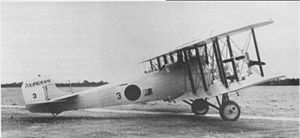LIMSwiki
Contents
| 2MB1 | |
|---|---|

| |
| Role | Bomber |
| National origin | Japan |
| Manufacturer | Mitsubishi |
| First flight | ca 1926 |
| Primary user | Imperial Japanese Army |
| Number built | 48 |
| Developed from | Mitsubishi B1M |
The Mitsubishi 2MB1 (service designation 八七式軽爆撃機, Army Type 87 Light Bomber) was a light bomber produced in Japan in the mid-1920s to equip the Imperial Japanese Army.[1][2]
Development
It was developed in parallel to the 2MB2, but while that aircraft featured an innovative and unorthodox design, the 2MB1 was a more conservative approach based closely on the 2MT carrier-based torpedo bomber that was already in production for the Imperial Japanese Navy.[2] Like the 2MT, the 2MB1 was a conventional two-bay biplane with open cockpits in tandem and fixed tailskid undercarriage. The 2MT's Napier engine and side-mounted radiators were exchanged for a Hispano-Suiza engine and frontal radiator, and specific naval features such as folding wings were deleted.
Operational history
The type saw action in the early stages of Japan's Invasion of Manchuria in 1931, but it was found to be obsolete and was soon relegated to training duties.
Specifications
Data from The Illustrated Encyclopedia of Aircraft
General characteristics
- Crew: Two, pilot and gunner
- Length: 10.00 m (32 ft 10 in)
- Wingspan: 14.80 m (48 ft 7 in)
- Height: 3.63 m (11 ft 11 in)
- Wing area: 60.0 m2 (646 sq ft)
- Empty weight: 1,800 kg (3,970 lb)
- Gross weight: 3,300 kg (7,280 lb)
- Powerplant: 1 × Hispano-Suiza , 336 kW (450 hp)
Performance
- Maximum speed: 185 km/h (115 mph, 100 kn)
Armament
- 1 × fixed, forward-firing 7.7 mm (.303 in) machine gun
- 2 × flexible 7.7 mm (.303 in) machine guns on ring mount in rear cockpit
- 1 × flexible 7.7 mm (.303 in) machine gun firing through ventral hatch
- 500 kg (1,102 lb) of bombs
Notes
References
- The Illustrated Encyclopedia of Aircraft. London: Aerospace Publishing.
- Taylor, Michael J. H. (1989). Jane's Encyclopedia of Aviation. London: Studio Editions.

















